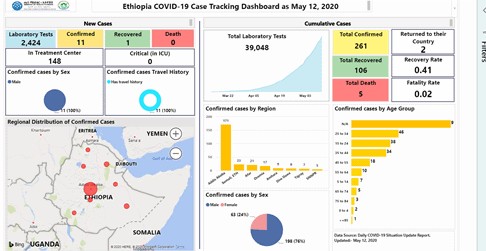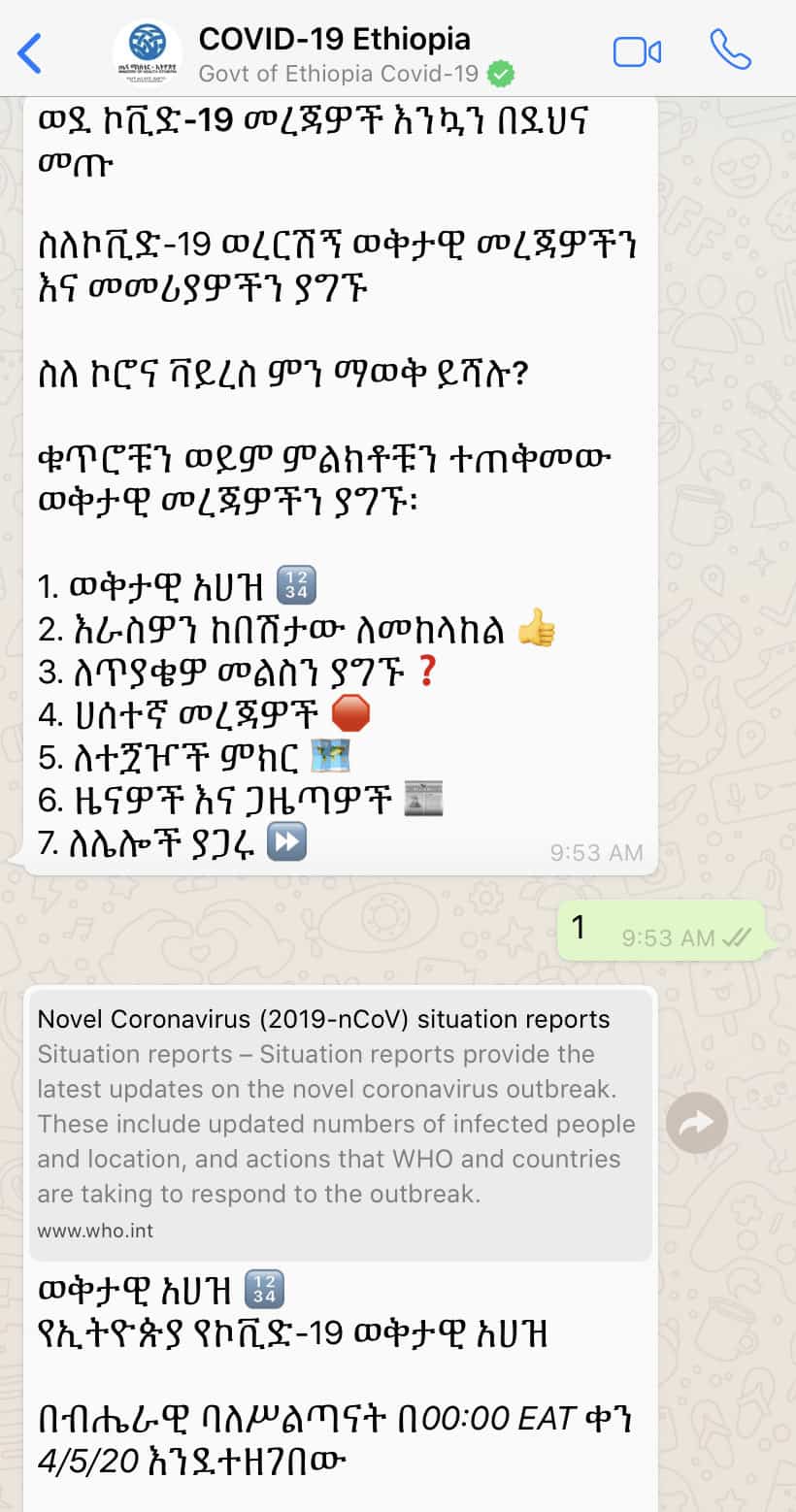Ethiopia’s Digital Health Response to COVID-19
May 14th, 2020 | viewpoint
The USAID Digital Health Activity (DHA), led by JSI, is applying its expertise in digital health and supply chain to play a leading role in Ethiopia’s response to COVID-19.
Hand sanitizer quality control: DHA developed a system to enable the Ethiopian Food and Drug Authority (EFDA) to monitor and control hand sanitizer quality, as part of the electronic regulatory information system (eRIS) that facilitates registration and import approval for food and medicines.
Manufacturers that receive a temporary license to produce alcohol-based sanitizer now use DHA’s quality control system to track the quality of their products in accordance with World Health Organization (WHO) standards.
Expedited product registration: DHA has also developed a simplified process to expedite licensing and registration of COVID-19 supplies. In the latest version of eRIS, applicants for expedited licensing such as alcohol-based sanitizer manufacturers do not have to enter the existing queue. The normal licensing process has been reduced with fewer documentation requirements. Previously, it took manufacturers three or more days to obtain licenses; thanks to DHA’s intervention they can now get their license the same day they apply for it. This version of eRIS is also designed to decrease the amount of physical time applicants spend at the EFDA, protecting both the applicants and EFDA staff. It also increases transparency and efficiency, allowing goods to reach the market more quickly.
Port-of-entry health declaration: Travelers will use an app to record personal identification information including phone number, travel history, health symptoms, and their Ethiopian residence geo-location. The forms will be generated via QR codes at all ports of entry (POE) to provide unique traveler identification. Screeners from Ethiopia Public Health Institute (EPHI) will then digitally record travelers’ temperature and attach it to their digital record for 14-day monitoring and follow-up. It is assumed that a traveler enrolled in this program who meets the definition of a suspected case (i.e., an asymptomatic traveler registered at the POE who later develops symptoms) will be enrolled into the COVID-19 case surveillance program. This application automates the Traveler’s Health Declaration Form for Coronavirus Disease form, a paper form that all passengers are required to complete upon entry to Ethiopia. DHA is supporting this activity in collaboration with Bill & Melinda Gates Foundation-funded Ethiopia Data Use Partnership (DUP) project.
Case surveillance and tracking: The DHA team, working with DUP, supported Ethiopia’s Ministry of Health (MOH) in the development and implementation of a national COVID-19 surveillance and tracking system. The system supports the enrollment and tracking of suspected cases; captures symptoms, demographics, risk factors, and exposures; creates lab requests; links confirmed cases with contacts; and monitors patient outcomes. It’s intended for health facility users, lab users, and national and local health authorities. The DHIS2-based tool facilitates surveillance workflows and automated analysis for key components of routine and active surveillance while leveraging WHO-recommended protocols.
The application also supports active case detection through contact-tracing activities, such as identification and follow-up of contacts of a suspected or confirmed COVID-19 case. The Contact Registration and Follow-up Program registers each contact of a confirmed case as a new tracked entity instance (or person) and links him/her to the case in the COVID-19 Case Surveillance Program via a ‘relationship.’ It has a simple repeatable follow-up function that registers symptoms and any follow-up.
Surveillance follow-up app: This application builds on the case surveillance tool and facilitates registration and follow-up of suspects and contacts of a confirmed case who will be followed for 14 days.
Health facilities reporting app: Health workers use this app to report suspected cases at health facilities to the rapid response teams.
Toll-free recording app: This app records and store data from individuals who call 8335 and 994 to report their health status and/or concerns.
Community house-to-house screening app: DHA in collaboration with DUP and other stakeholders supported the development of a mobile app for Health Extension Workers (HEWs) to serve as a data collection tool and job aid for nationwide door-to-door COVID-19 screening campaigns. The app is being used by 173 health workers in Addis Ababa only.
Data analytics and visualization: DHA and DUP jointly supported MOH and EPHI to develop a tracking dashboard to monitor COVID-19 and visually present epidemiological information to inform preparedness and response measures. The dashboard, which is built on Microsoft’s PowerBI software, pools data from the DHIS2 COVID-19 Case Surveillance app and the data depot.

WhatsApp helpline: DHA and DUP are also configuring WhatsApp to provide citizens with correct information by supporting the health system as it responds to and informs the public about the pandemic. In collaboration with Praekelt.org, DHA and DUP have developed a WhatsApp-based helpline to support users on health queries or concerns and direct them to accurate information sources. The system will provide automated information responses with answers to the most frequently asked questions and relieve traffic to call center helplines that are currently overwhelmed. The application will use machine learning and natural language understanding to enable automatic triage, helping to manage conversations at scale.

Rumor and suspected cases reporting and investigation: Community members use this app for self-reporting when they have COVID-19 symptoms. It also provides information about where people can volunteer, request help, learn more about the pandemic, and report rumors. Communities can report their COVID-19 status on WhatsApp and via SMS as well.
JSI is helping several countries respond to COVID-19. Find out more about JSI’s digital health work.
We strive to build lasting relationships to produce better health outcomes for all.